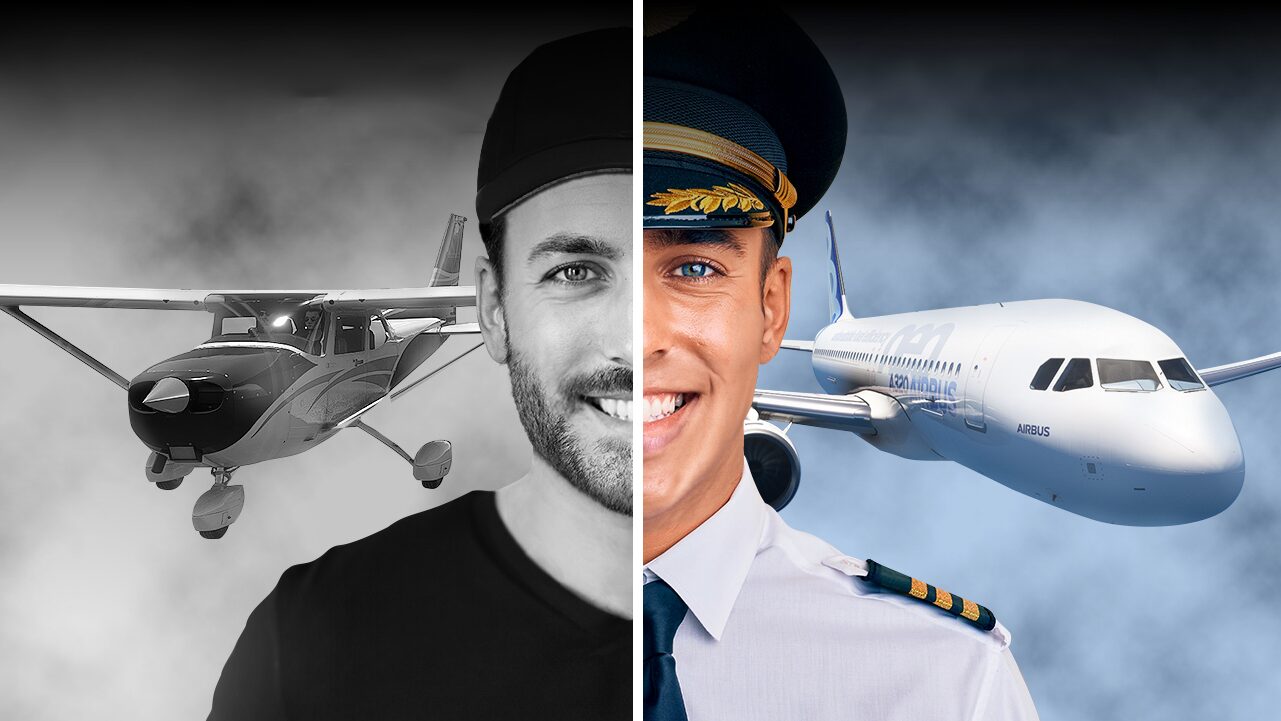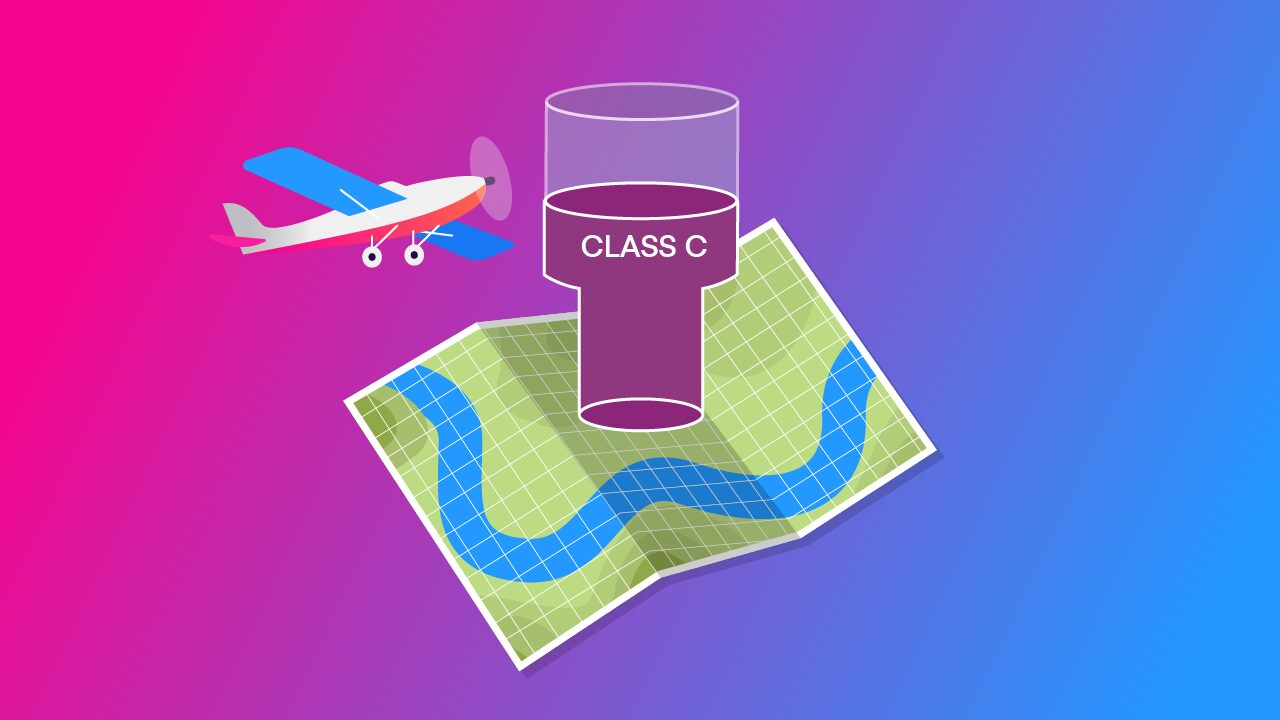-
Key Takeaways
-
Do Pilots Need a College Degree?
- Airline Hiring Standards
- Industry Demand
-
The Pros of Having a Degree in Aviation
- Networking Opportunities
- Staying Competitive in the Job Market
- A Safety Net in Tough Times
- Choosing the Right Degree
-
Flying Without a Degree—Paths to Becoming a Pilot
- Trade Schools & Community College
- Flight Academies
- Private Instruction
- The Path That Fits You
-
Airlines and Degree Preferences—What Matters Most?
- Airline-Sponsored Training Programs
- How You Can Make It Without a Degree
-
Is a Degree Worth It for Aspiring Pilots?
- Factors to Consider
- The Pros of College
- The Cons
-
Conclusion
Do you dream of being a pilot but wonder if you need to go to college? Lots of people have the same question!
Many aspiring pilots feel confused about what’s required to start their journey.
Here’s something you should know: while a degree can help in some cases, it’s not always necessary. There are plenty of ways to reach your goals without stepping into a college classroom.
Let’s break it all down so you can decide what’s best for you.
Key Takeaways
- A degree isn’t required for an FAA certificate but can boost job prospects.
- College helps with networking, job market edge, and fallback options.
- Trade schools, flight academies, and private training offer alternative paths.
- Flight hours, certifications, and soft skills are as valuable as a degree.
Do Pilots Need a College Degree?
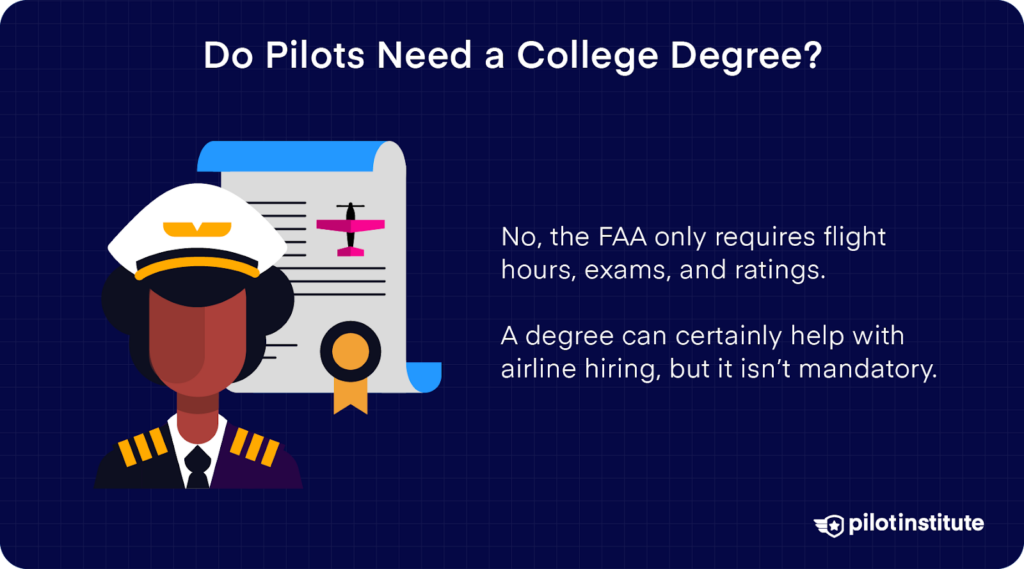
If this question is on your mind, the short answer is: No. Well, not to meet FAA requirements.
The Federal Aviation Administration (FAA) doesn’t require a college degree for any pilot certification, from your private pilot license (PPL) to the airline transport pilot (ATP) certificate. What truly matters to them is completing the required flight hours, passing your exams, and earning the necessary ratings.
But depending on your flying goals, the answer isn’t always so simple. Let’s take a closer look.
Airline Hiring Standards
Do you want to work for the airlines? While you won’t need a degree to get your license, some airlines do have preferences.
Many major carriers, like Delta or United, tend to favor applicants with a four-year degree. This is especially true for competitive roles.
It’s less about the specific degree, and more about showing your ability to complete a standard program. In these cases, having a degree might give you an edge when competing with other qualified candidates.
This isn’t a hard-and-fast rule, however. You can still be hired without a college degree, especially if you bring strong experience, advanced certifications, and solid recommendations.
Regional airlines tend to focus more on flight hours and practical skills than academic qualifications.
Industry Demand
The biggest factor? The demand for pilots–which no one can predict.
When the industry faces a pilot shortage, hiring standards tend to get looser. Airlines would favor candidates with the right qualifications just as much as those with degrees.
Take the recent increase in demand for commercial pilots, for example. Airlines have shifted their focus toward getting pilots into the cockpit faster, with less emphasis on formal education.
But during times of low demand, the opposite happens, and hiring becomes more selective. Airlines will use a college degree as a tie-breaker when choosing between equally skilled candidates.
So, ask yourself these questions:
- Are you aiming for a major airline or a regional carrier?
- Do you have opportunities to gain flight hours and certifications early?
- Would pursuing a degree now fit into your timeline and career goals?
If you’re serious about long-term career flexibility, getting a degree might be worth considering. But if you’re ready to jump straight into flying, know that an incredible career is still within reach!
The bottom line? A college degree isn’t a requirement, but it can be a valuable asset. Whether you decide to pursue one depends on your goals and how you chart your course to the sky.
The Pros of Having a Degree in Aviation
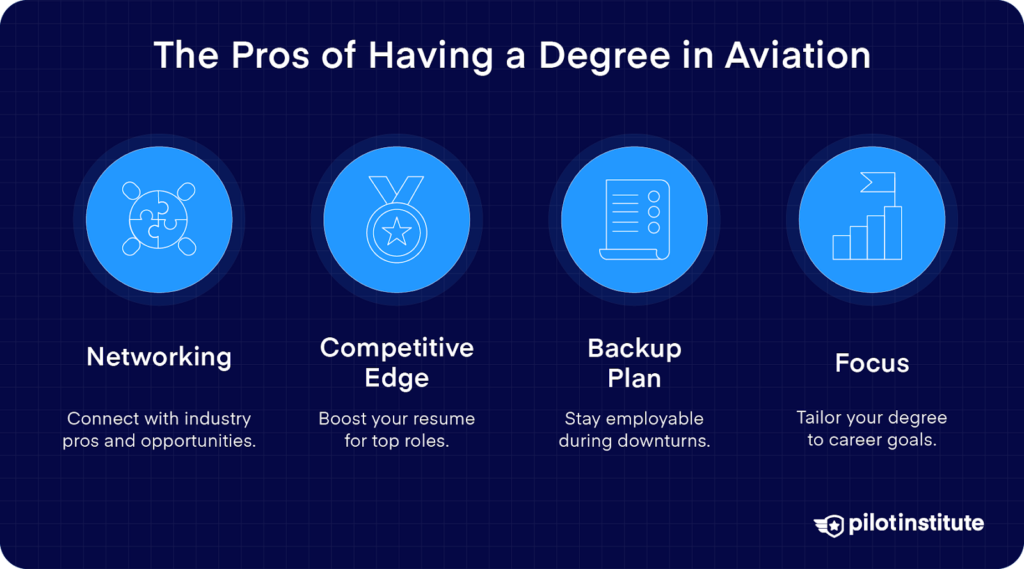
While it’s not a requirement to become a pilot, the benefits of an aviation-related degree go beyond just flying. It’s not just about getting the diploma—it’s about the doors it can open.
Still on the fence about college? Let us give you some solid reasons why you should consider a degree in aviation.
Networking Opportunities
One of the biggest advantages is the connections you’ll make.
Colleges and universities often partner with flight schools, airlines, and industry organizations. These networks can help you land internships, mentorships, or even your first job!
Professors with industry experience might connect you to recruiters. They can also give you insights beyond what you’d learn in a flight manual.
Think of college as more than just the classroom experience. This is your chance to surround yourself with people who share your passion for aviation. It’s a great avenue to build relationships that will shape your career in the future.
Staying Competitive in the Job Market
When competing for top-tier positions, having a degree will definitely give you a leg up. Airlines use it as a factor when screening candidates for leadership roles or specialized positions.
It signals to employers that you’ve invested time to develop both technical and theoretical knowledge, even in roles that don’t require a degree.
A degree in aviation management or aeronautical science, for instance, doesn’t just teach you about flying. It equips you with skills in safety protocols, regulations, and even business management. You’ll have proof that you’re a well-rounded candidate.
A Safety Net in Tough Times
As we’ve all learned, the aviation industry is very unpredictable. Economic downturns, pandemics, or changes in regulations can all impact pilot demand.
In times like these, a degree will act as your backup plan. For instance, if you hold a degree in aviation management, you can fall back on an administrative role in the meantime. An aeronautical engineering degree could lead to opportunities in aircraft design or maintenance.
And when the dust has settled, and the industry is back on its feet, you’ll have a college degree and work experience to show in your resume!
Instead of being grounded by circumstances, your education can help you pivot and stay connected to aviation in other meaningful and fulfilling ways.
Choosing the Right Degree
If you’re interested in flying, degrees like aeronautical science or aviation technology focus on enhancing your piloting skills and understanding of aircraft systems.
Aviation management, on the other hand, is ideal if you’re eyeing leadership roles or business opportunities in the industry.
The key is choosing a degree that:
- Aligns with your career goals.
- Gives flexibility for the future.
Whether networking, career growth, or a fallback plan, an aviation-related degree can give you a solid foundation.
Flying Without a Degree—Paths to Becoming a Pilot

Looking for a more alternative approach? If a 4-year degree program really isn’t for you, there are other paths you can take!
Many pilots build successful careers even after skipping the traditional bachelor-degree route altogether. Let’s explore these options and see how they measure up.
Trade Schools & Community College
Trade schools and community colleges can help you learn additional aviation-related skills. These institutions are designed for efficiency. They offer courses that can give you skills to help you pay for flight training while still staying in the aviation field.
While some may not directly provide flight training, they can provide a career in a related field. This can be a helpful stepping stone. One of the main advantages of skipping a degree is the potential to save time and money.
Trade schools have a comprehensive mix of flight training and technical courses. You can choose from programs like:
- Aviation Mechanic
- Air Traffic Controller
- Aviation Welder
- Cabin Crew
- Professional Pilot (Community College)
Want to develop practical skills to help you pay for your flight training? This might be the path for you.
These programs typically last 1-2 years, providing a faster route to a career rather than traditional four-year degrees. They can range from $20,000 to $60,000, making them a more affordable option while equipping you with useful technical skills.
This broad scope can open doors to aviation careers beyond just flying, giving you more versatility in the field.
Flight Academies
If you’re looking for a direct, immersive pathway into aviation, flight academies provide all-inclusive training.
These programs guide you through every step, from earning a PPL to obtaining commercial and ATP certifications. It has a highly structured training environment with advanced simulators and experienced instructors.
Flight academies deliver top-tier training in just 12-24 months. Your expenses can range from $70,000 to $120,000.
Many academies also partner with airlines or corporate operators, giving you clear pathways to your first flying job!
This streamlined, career-focused approach makes them an excellent choice if you want to start working as a pilot as quickly as possible.
Private Instruction
Maybe you’re looking for something more flexible?
Private instruction allows you to train at your own pace with a Certified Flight Instructor (CFI) at a local airport.
This personalized approach is perfect if you’re balancing other responsibilities or if you prefer a less rigid schedule. While costs vary depending on your location and training speed, you can expect to spend between $50,000 and $70,000 from PPL to commercial ratings.
Since you pay as you go, the expenses are spread out over time. This option will give you a more manageable financial commitment.
These paths let you bypass the academic requirements of a traditional degree. Instead, you’ll be focused entirely on your piloting goals!
The Path That Fits You
At the end of the day, choosing the right path depends on your goals and circumstances.
- Want a fast, immersive experience? Flight academies offer a direct, focused route.
- Looking for flexibility? Private instruction can fit around your schedule.
- Interested in a broader technical foundation? Trade schools combine hands-on aviation training with transferable skills.
With focused training and strategic planning, you can soar into your aviation career on your terms.
Where can you find work without a college degree? Southwest Airlines, Ryanair, and EasyJet are some great examples. They focus on flight hours, certifications, and performance.
JetBlue’s Gateway Select program also offers a pathway to becoming a pilot without a college degree, emphasizing aptitude and training instead.
Airlines and Degree Preferences—What Matters Most?
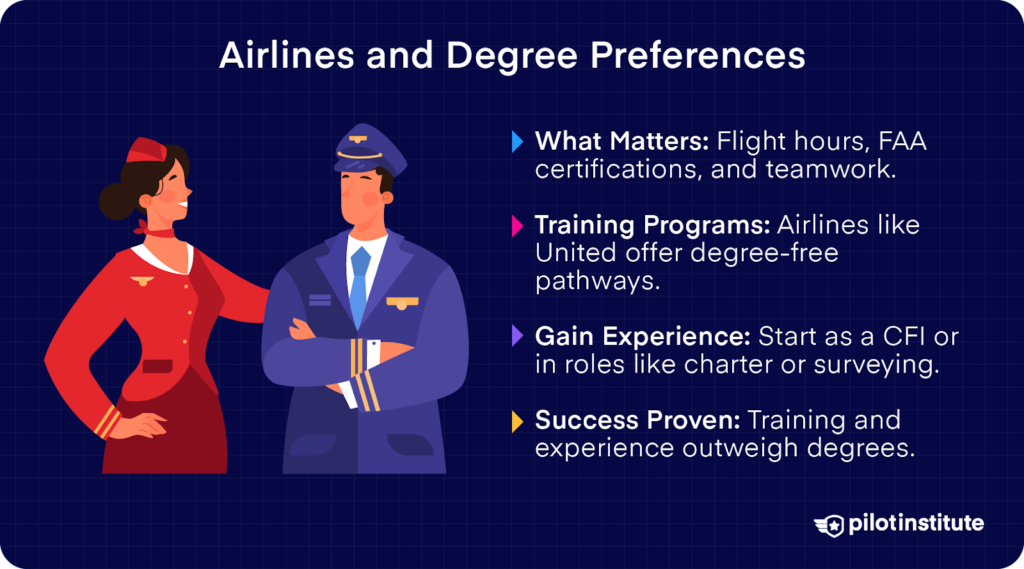
We’ve cleared that becoming a pilot doesn’t always mean you need a college degree. Airlines today care more about the skills and experience you bring to the cockpit.
While having a degree can sometimes help, it’s not always the deciding factor when landing a job. So, what do airlines look for?
Here’s what matters most:
- Flight hours: Like any skill, flying is one that you can only really develop with time and practice. The more hours you have in the air, the better. It’s concrete proof of your experience, showing you’re ready to handle real-world flying.
- Certifications: You wouldn’t have earned your certificate if you hadn’t met the standards set by the FAA. These are essential for any pilot job, from your private pilot license to your airline transport pilot rating.
- Soft skills: Traits like good communication, staying calm under pressure, and working well with others are vital in the cockpit. These will guarantee you a successful career in aviation.
Airline-Sponsored Training Programs
To meet the growing demand for pilots, many airlines have started their own training programs. These programs focus on helping you build the skills you need, often without looking for a degree!
For example, United Airlines offers the Aviate program, a clear pathway from training to flying with them. Other airlines have since followed suit, launching cadet programs that will guide you from basic training all the way to your first airline job.
These programs often include financial support and mentorship. They’ll make it easier for you to pursue your dream of flying without a traditional college education.
How You Can Make It Without a Degree
Need more reassurance? We’ve got you covered.
There are so many pilots out there who have achieved success even without a college diploma. Instead, they focused on hands-on training and gaining real-world experience.
A typical starting point is working as a flight instructor. Many pilots decided to complete the 250 flying hours to get their flight instructor certificate. Then, they got a job as a CFI, earning money while building their hours for airline pilot positions!
What other options are there? Some pilots begin in corporate or charter aviation, flying private jets or small charter airplanes. Not only do these roles provide valuable hours, but they also develop the soft skills that airlines value. They’ll teach you how to be professional and adaptable.
Some even take on more niche or unconventional jobs like aerial surveying, banner towing, or crop dusting.
Many of these pilots then move up to regional airlines or corporate roles and eventually make their way to major carriers. This proves that certifications, training, and experience are just as important as–if not more than–a college degree.
Is a Degree Worth It for Aspiring Pilots?
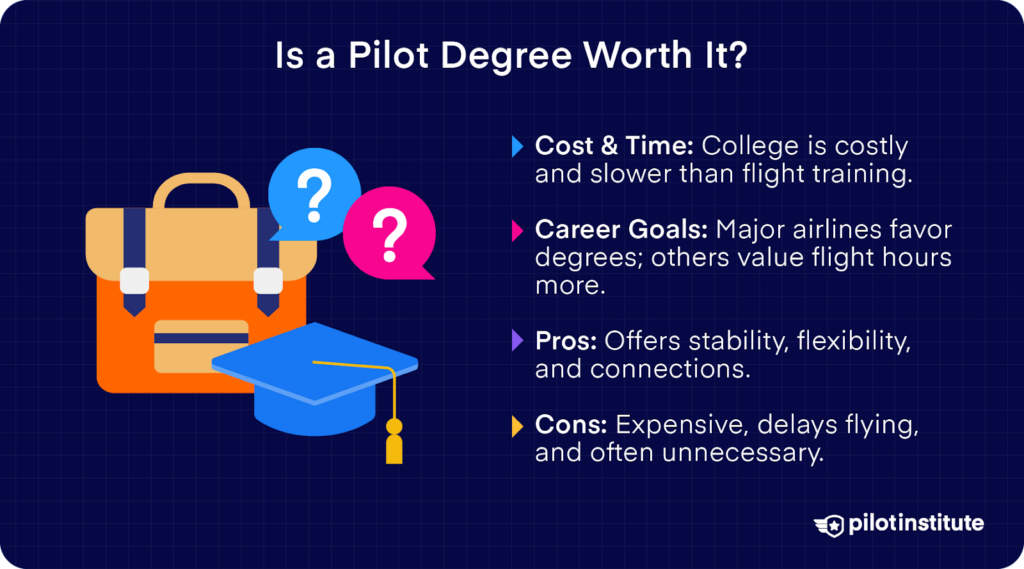
Now that we’ve gone through your options, it’s time to answer the question: Is a college degree worth it?
While some pilots swear by the value of a degree, others prefer to jump straight into flight training. With all this contradiction, the answer becomes clear: It depends on you.
How you chart your course is up to you. Whether or not you choose college, your success will ultimately depend on you.
So, let’s explore how these choices can shape your path.
Factors to Consider
First, evaluate your priorities and where college fits into your life right now. Keep these factors in mind:
- Cost: A four-year aviation degree can cost $80,000 or more, significantly higher than many flight schools. This doesn’t include flight training costs, which are often added on top of your tuition. Evaluate your budget and see if college is a feasible option.
- Time commitment: Earning a degree takes about four years, while flight schools or academies can prepare you for the cockpit in 12-24 months. If you have plenty of time, college might be worth pursuing! If you have other responsibilities on your plate, there are other paths you can take.
- Personal goals: If you aim to work for major airlines, a degree may help you stand out. For other paths, such as private charter or corporate aviation, certifications and flight hours often matter more.
The Pros of College
Pursuing a degree has its advantages. It gives you long-term stability, so you’ll have a fallback option in aviation or another field if you decide to step away from flying.
Many airlines, especially larger ones, view a degree favorably. Candidates with a degree will definitely stand out from the rest. This becomes especially true when the competition is high.
College can also help you build valuable connections with industry professionals, which might open doors later in your career.
If you’re an aspiring commercial airline pilot, particularly for a larger carrier, a degree can be very helpful. It can give you a leg up and offer flexibility for career shifts later on.
The Cons
On the downside, a degree is a significant financial investment that often leads to student loan debt. Additionally, the four-year timeline delays the start of your flying career, leaving you with fewer opportunities to log hours and build experience in the early stages.
For many, the degree’s benefits don’t directly translate to better flying skills or career prospects. If you’re leaning toward private charter or even a regional airline, certifications and flight hours usually matter more.
So, skipping the degree in favor of flight training could save you time and money while getting you in the cockpit sooner.
Conclusion
If you’ve been holding back because you thought a degree was a must, it’s time to rethink that. Decide between flight schools, airline programs, or self-paced training.
You have options that don’t involve spending years in college. The truth is, your skills, determination, and flight hours matter way more than a diploma.
So why wait? Start planning your path to the cockpit today—you’ve got this!

